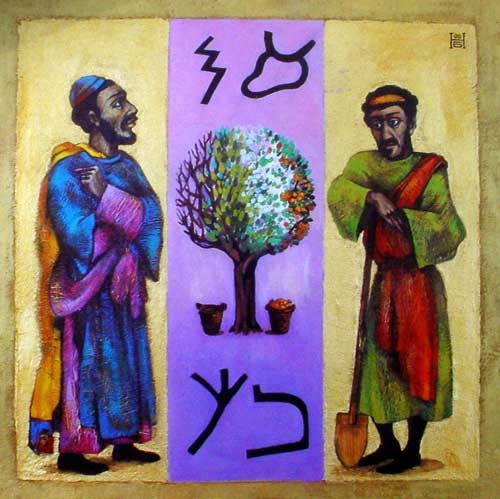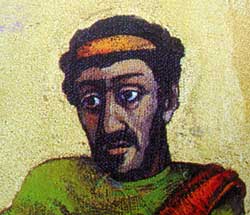Luke 13:1-9


 "The Unfruitful Fig Tree and the Servants Duty" by Kazakhstan Artist Nelly Bube.
"The Unfruitful Fig Tree and the Servants Duty" by Kazakhstan Artist Nelly Bube.
NECESSITY FOR CONSTANT REPENTANCE
Luke 13:1 Now there were some present at that time who told Jesus about the Galileans whose blood Pilate had mixed with their sacrifices.
This was a very opportune time for Jesus to teach an important lesson. There is no record of this incident in secular history. Evidently these Galileans had done something which infuriated Pilate. He had his soldiers cut them down while they were sacrificing in the Temple.
Luke 13:2 Jesus answered, "Do you think that these Galileans were worse sinners than all the other Galileans because they suffered this way?
Luke 13:3 I tell you, no! But unless you repent, you too will all perish.
The "no!" is very strong. People often mistakenly attach supposed special punishments for particular sins. Job's friends mistakenly accused him of particular secret sins for which God was supposedly punishing him. Look at John 9:1-3 . Human nature is quick to attach special punishment of God to exceptional suffering. From God's point of view that may be so. Look at Acts 12:20-23. But even this revealed instance should cause us to repent and not sit in judgment. God wants man's reaction to be repentance, not judgment.
Luke 13:4 Or those eighteen who died when the tower in Siloam fell on them -- do you think they were more guilty than all the others living in Jerusalem?
Jesus cites a second current incident but it differs in this that the agent was not a human being but God Himself who permitted it to happen. The tower was well known. Commentators think that this tower was part of the city wall in the southeastern part of Jerusalem. In verse 2 "sinners" is used in the sense of what they had committed against God. Here the word denotes "sinner-debtors" in the sense of what they owed God or failed to do.
Luke 13:5 I tell you, no! But unless you repent, you too will all perish."
This verse is essentially a repetition of verse 3 for the sake of emphasis.
Luke 13:6 Then he told this parable: "A man had a fig tree, planted in his vineyard, and he went to look for fruit on it, but did not find any.
There is an obvious connection between verses 1-5 and 6-9. Does "parable" mean a parable with an unadorned point of comparison, or an allegory with multiple points of comparison? Commentators differ on this and we shall note it as we go along. Is God the owner of the vineyard, Christ the vineyard keeper, the fig tree Jerusalem, etc.? Arndt denies this. Ylvisaker, Lenski, and Fahling affirm it. More as we go along.
Luke 13:7 So he said to the man who took care of the vineyard, 'For three years now I've been coming to look for fruit on this fig tree and haven't found any. Cut it down! Why should it use up the soil?'
The point is that three years ago the fig tree had reached the point at which it should have borne fruit. Do the three years denote a long, indefinite period of grace, not to be identified with any specific period, or the time of the Old Testament Covenant? Of the three years of Jesus' ministry? Or the three years covering the ministry of the Baptist and Jesus? Commentators differ. We give our opinion later. Not only was the tree not bearing fruit, but it was also taking up valuable space.
Luke 13:8 'Sir,' the man replied, 'leave it alone for one more year, and I'll dig around it and fertilize it.
"Sir" as most of the English translations have it, probably indicates that this is a simple parable and that "Jehovah" is meant. Beck straddles the fence by translating "Master" which could be taken either way. "One more year," does this mean an indefinite additional period of grace, or until the death of Christ, or until the destruction of Jerusalem? Commentators differ. Ylvisaker says: "In a homily, the cultivating and the fertilizing may be applied aptly to the work of the Law and of the Gospel."
Luke 13:9 If it bears fruit next year, fine! If not, then cut it down.'"
There are only two alternative possibilities. Either repentance will take place or it will not. All our translations take the first sentence as an instance of ellipse or aposiopesis, which means that the apodosis is supplied by the reader. Note NASB, which translates: "And if it bears fruit next year, FINE." The apodosis is to be understood: "it is well" , or "I will leave it to stand," or "Let it bear fruit." All these are more or less the same. Note that we have two types of conditions here. The first is a future more vivid tense, denoting logical consequence. But the second is a fact condition or condition of reality. In Classical Greek this type of condition denotes a threat. Whether that can be pressed here is not certain. But it certainly is a warning.
These notes suggest that Fahling correctly interprets the parable:
The best interpretation seems to be to take the three years as the whole period of grace given to Israel in the Old Testament in which the chosen fig-tree was expected to yield fruit acceptable to God. 'The fourth year' for which the Vine-dresser, Jesus, pleaded, was the special period of grace, which dawned with the ministry of the apostles. The extra time went by, and the fig-tree was cut down, with the destruction of Jerusalem and the dispersion of the race.
This is similar to the interpretation of Stoeckhardt who notes Isaiah 5:1-7 as a parallel passage. Arndt feels that the single point of the story is the long-suffering of God, look at 2 Peter 3:9, which no age, people, or individual should play with.
SDG
Adapted from Exegetical Notes, Series C Luke-John, Festival Season Sundays Gospel Texts, by Harold H. Buls, Concordia Theological Seminary Press: Ft Wayne IN, 1979,
Return to top
Return to Buls' Notes Index





